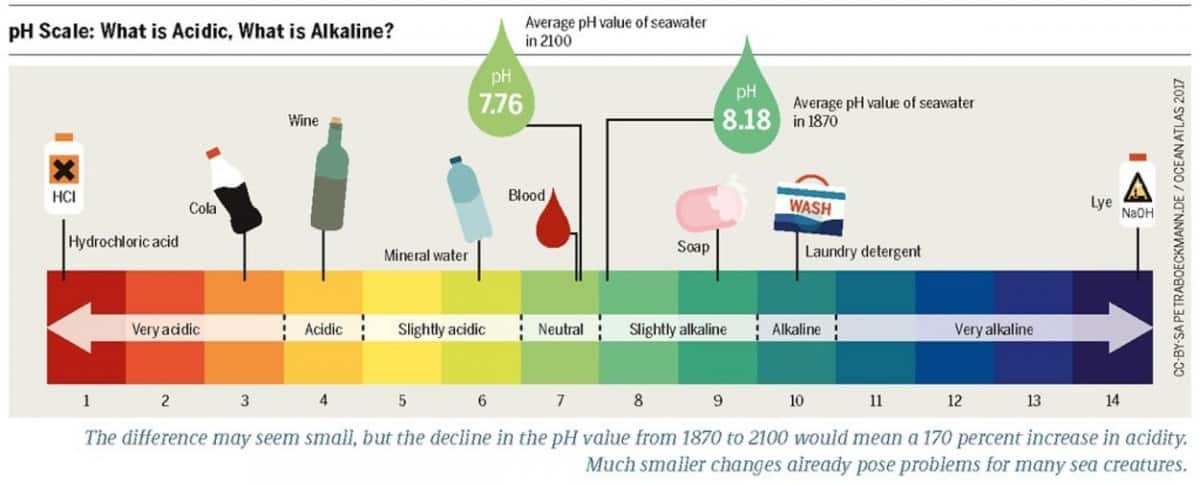Nine major acids contribute to the unique flavor of coffee, which is released during the brewing process.
And these are the major acids found in coffee, from lowest to highest:
- palmitic
- linoleic
- phosphoric
- malic
- lactic
- ascetic
- citric
- quinic
- chlorogenic
Does this make coffee acidic?
There are several factors at play when it comes to the acidity level of coffee such as roasting, brewing, and ground size.
A cup of coffee has an average pH value of 4.85 to 5.10 which is indeed considered acidic based on the pH scale.
Black coffee has a pH value of around 5, making it acidic as well. The natural acids contained in coffee beans also come with healthy antioxidants. However, for some sensitive people, coffee can also cause heartburn and acid reflux.
For the nitty-gritty details about the acidity level of your cup of coffee, keep reading!
Is Coffee Acid or Base?
Coffee is undoubtedly acidic!
The pH scale shows that this beverage is within the acidity level. It is considered slightly acidic and also less acidic than coffee, beer, and soda.
Coffee contains chlorogenic acid, tannins, and polyphenols, which are all acidic properties. Plus, the brewing process releases nine major acids which add up to its acidity level.
Here’s a trick that I have learned to measure the acidity of my coffee:
Get a litmus paper and dip it in your cup of coffee. If it turns red, then your coffee is acidic!
Go ahead. Try it!
How Can I Make My Coffee Less Acidic?
The good thing is, coffee acidity can be reduced by following these techniques:
- Go for a cold brew instead of hot coffee.
- Use a lower temp when brewing your coffee.
- Change to a coarser grind.
- Brew your coffee longer.
- Go for a dark roast.
But don’t overreact about coffee acidity because some of the acids in coffee are actually healthy for some people. For example, the chlorogenic acid in coffee, which makes the beverage taste bitter, can help you lose weight.
Watch this short clip to learn ways how to reduce the acidity of coffee.
Is Black Coffee Acidic?
Yes, black coffee is technically acidic but not by much!
Black coffee has a pH level of 5 to 5.03 which is slightly acidic. To put it into perspective, black coffee and banana have similar pH levels.
So, to test how acidic other varieties of coffee are, I have done my experiment using a pH digital meter. And voila, here are the results!
| Types of Coffee | pH Level |
| Cold Brew | 6.20 |
| Iced Coffee | 5.23 |
| Coffee with 2% Milk | 6.20 |
| Costa Rica Dark | 4.90 |
| Costa Rica Light | 4.90 |
Whichever type of coffee you prefer, I suggest you watch out for its pH level to avoid stomach irritations.
Is Coffee With Milk Acidic?
Coffee itself is considered to be acidic because it contains various acids, including chlorogenic acid, quinic acid, and citric acid.
However, the acidity of coffee can be reduced by adding milk or cream.
Milk is slightly alkaline, with a pH between 6.5 and 6.7, which can help neutralize some of the acidity in coffee.
However, it’s important to note that some people may still experience acid reflux or other digestive discomforts when drinking coffee with milk, especially if they are sensitive to lactose or have other underlying digestive issues.
Additionally, the acidity of coffee can vary depending on factors such as the type of coffee beans, the brewing method, and the roast level, among others.
Is Coffee Alkaline?
No, coffee is not alkaline.
Alkali is a type of strong base and alkaline substance tends to have a pH higher than 7. Any substance with pH level that are below 7 are considered acidic and those with pH higher than 7 are considered alkaline or basic.

So, based on its pH value, coffee isn’t alkaline but slightly acidic.
For reference, here’s a list of natural alkaline drinks:
- pure water
- raw milk (both cow and goat)
- unsweetened tea (including herbal and green tea)
- natural or unsweetened fruits and vegetable juices with negative potential renal acid loads
If you’re curious to know the benefits of an alkaline diet, check out this study.
Is Coffee Bad for Acid Reflux?
Yes, coffee is bad for acid reflux.
Coffee is one of the most common triggers of acid reflux but it will only happen if you drink too much of it.
As per the US Food and Drug Administration guidelines, 400 mg of caffeine per day is within the limit of safe consumption. That means going past 400 mg may lead to acid reflux, heartburn, and other caffeine-related symptoms.
Coffee heartburns or acid reflux happens when the muscle that connects to the stomach and esophagus is relaxed creating an opening for stomach acid that comes up to your esophagus. Gross!
I’m really sensitive to acidity and based on experience, cold-pressed coffee is the best way to have the least amount of acidity.
Here are other ways to avoid acid reflux:
- Choose low-acid coffee.
- Choose shade-grown coffee.
- Add a dash of salt to your coffee.
- Go for cold brewed coffee.
- Use acid reducers.
What Drink is Good for Acid Reflux?
If you think you’re suffering from acid reflux due to drinking coffee, here are a few beverages that can help relieve it:
- skim milk
- plant-based milk
- fruit juice
- smoothies
- water
- coconut water
- herbal tea
What Kills Acidity In Coffee?
Several factors can reduce the acidity in coffee, including:
Adding Milk or Cream: As mentioned earlier, milk or cream is slightly alkaline and can help neutralize the acidity in coffee.
Choosing the Right Beans: Some coffee varieties are naturally lower in acid than others, as mentioned in my previous response.
Choosing a Darker Roast: Darker roasts, such as French or Italian roasts, are generally lower in acidity than lighter roasts because the roasting process breaks down the acids in the beans.
Using Cold-Brew Method: Cold-brewed coffee is generally less acidic than hot-brewed coffee because the cold-water method extracts fewer acids from the beans.
Using Low-Acid Coffee Beans: Some brands of coffee sell low-acid coffee beans that are specially processed to reduce the acidity levels in the beans.
It’s important to note that while these methods can help reduce the acidity in coffee, they may also affect the overall flavor and taste of the coffee.
It’s best to experiment and find the right method that works best for your individual taste preferences and digestive needs.
What Does Acidic Coffee Taste Like?

Acidic coffee tastes harsh and sour especially when over-roasted and brewed incorrectly.
This is the reason why there are guides on how to correctly roast and brew certain types of coffee. Baristas pay close attention to these to get the best out of the natural flavor of the beans without compromising the acidity of the mix.
Coffee beans should be brewed enough to extract all the good flavors out of it and make a balanced cup with just the right amount of acidity.
So, make sure to brew your coffee properly!
Why is Coffee Acidic But Bitter?
The topic of why acidic coffee tastes bitter has been the subject of different research for coffee, and it has proven to be a question that is not so easy to answer.
Since even researchers are having a hard time finding answers to this, alternatives are presented to balance out the bitter taste of coffee instead of having that harsh lingering taste.
The bitterness of the coffee can also be attributed to the impact of chlorogenic acids present in coffee beans. Also, how the beans are roasted affect how bitter tasting the coffee would get.
The following factors affect the bitter taste of your coffee:
- roasting
- grinding
- brewing method
- water temperature
Take note of these things when preparing your coffee or when deciding what coffee to get from the market.
Is Decaf Coffee Acidic?
Decaf coffee is acidic too but it is a better option if your stomach is sensitive to acid content.
The reason is, caffeine generates more acid in your stomach leading to heartburns and acid reflux. So, if you’re suffering from gastroesophageal reflux disease (GERD), decaf coffee is definitely a better choice.
I prefer decaf that goes through the mountain water process because it removes the caffeine safely without the use of harsh chemicals.
Moreover, here are my top picks for the best decaf coffee:
- Costa Rica Tarrazu Decaf Coffee
- Lion Gold Roast Decaf
- Organic Sumatra Swiss Water Decaf
- Organic Black Knight Decaf
- No Fun Jo Organic Decaf
I guarantee these are all good, and you won’t regret using any of them!
Is Coffee Acidity Bad for Teeth?
Coffee acidity is bad for your teeth because the acids in this beverage may erode the tooth enamel.
Enamel covers the outer surface of your teeth and is also the hardest substance in the human body. The acids found in food and liquids that you consume are the main causes of enamel erosion.
So, the outer layer of the enamel degrades over time if you consume acidic food and liquids. And that’s how you get bad teeth from drinking too much coffee!
However, one way to prevent it from happening is to make sure you clean your teeth properly after drinking coffee or any acidic drink.
Which Coffee Is low in Acid?
While all coffee beans contain some level of acidity, some coffee varieties are naturally lower in acid than others. Here are some types of coffee that are generally considered to be low in acid:
- Sumatra: Sumatra coffee beans are grown in Indonesia and have a low level of acidity due to the region’s unique soil and growing conditions.
- Brazil: Brazilian coffee is known for its mild flavor and low acidity, making it a popular choice for those who want a less acidic coffee.
- Guatemala: Guatemalan coffee has a balanced flavor with moderate acidity, but some varieties are known for their low acidity, such as beans grown in the Huehuetenango region.
- Mocha Java: Mocha Java is a blend of coffee beans from Yemen (Mocha) and Java, which produces a coffee with a low acidity and a slightly sweet flavor.
- Decaffeinated Coffee: Decaffeinated coffee is generally lower in acidity than regular coffee because the decaffeinating process removes some of the acids.
The level of acidity in coffee can also depend on the brewing method, roast level, and other factors, so it’s best to try different types of coffee to find which works best for your individual taste preferences and digestive needs.

The Bottom Line
So, coffee is indeed acidic, or slightly acidic to be precise!
Your cup of coffee is loaded with various acidic properties which contribute to its unique flavor.
All the acids found in coffee can be both healthy and unhealthy for you. And they also make your coffee taste nice!
Moreover, not all acids can cause acidity and heartburn. So, rest your worries because the acidity level of coffee is not that bad at all.
Still, you should consume this beverage in moderation to avoid acid reflux, heartburn, caffeine overdose, and other health complications.
If you’re sensitive to acid, I recommend going for cold brew or decaf coffee because they are slightly acidic.
Of course, don’t forget to make your coffee less acidic and brush your teeth after!
Cheers!
Other Articles
- Click here to see this post’s visual story
- Best Coffee for Acid Reflux (Read and Find Out)
- Low Acid Coffee (Here’s What You Should Know)
Click here to view the Visual Story Version of this Article.
Contents
- 1 Is Coffee Acid or Base?
- 2 How Can I Make My Coffee Less Acidic?
- 3 Is Black Coffee Acidic?
- 4 Is Coffee With Milk Acidic?
- 5 Is Coffee Alkaline?
- 6 Is Coffee Bad for Acid Reflux?
- 7 What Drink is Good for Acid Reflux?
- 8 What Kills Acidity In Coffee?
- 9 What Does Acidic Coffee Taste Like?
- 10 Why is Coffee Acidic But Bitter?
- 11 Is Decaf Coffee Acidic?
- 12 Is Coffee Acidity Bad for Teeth?
- 13 Which Coffee Is low in Acid?
- 14 The Bottom Line
- 15 Other Articles

